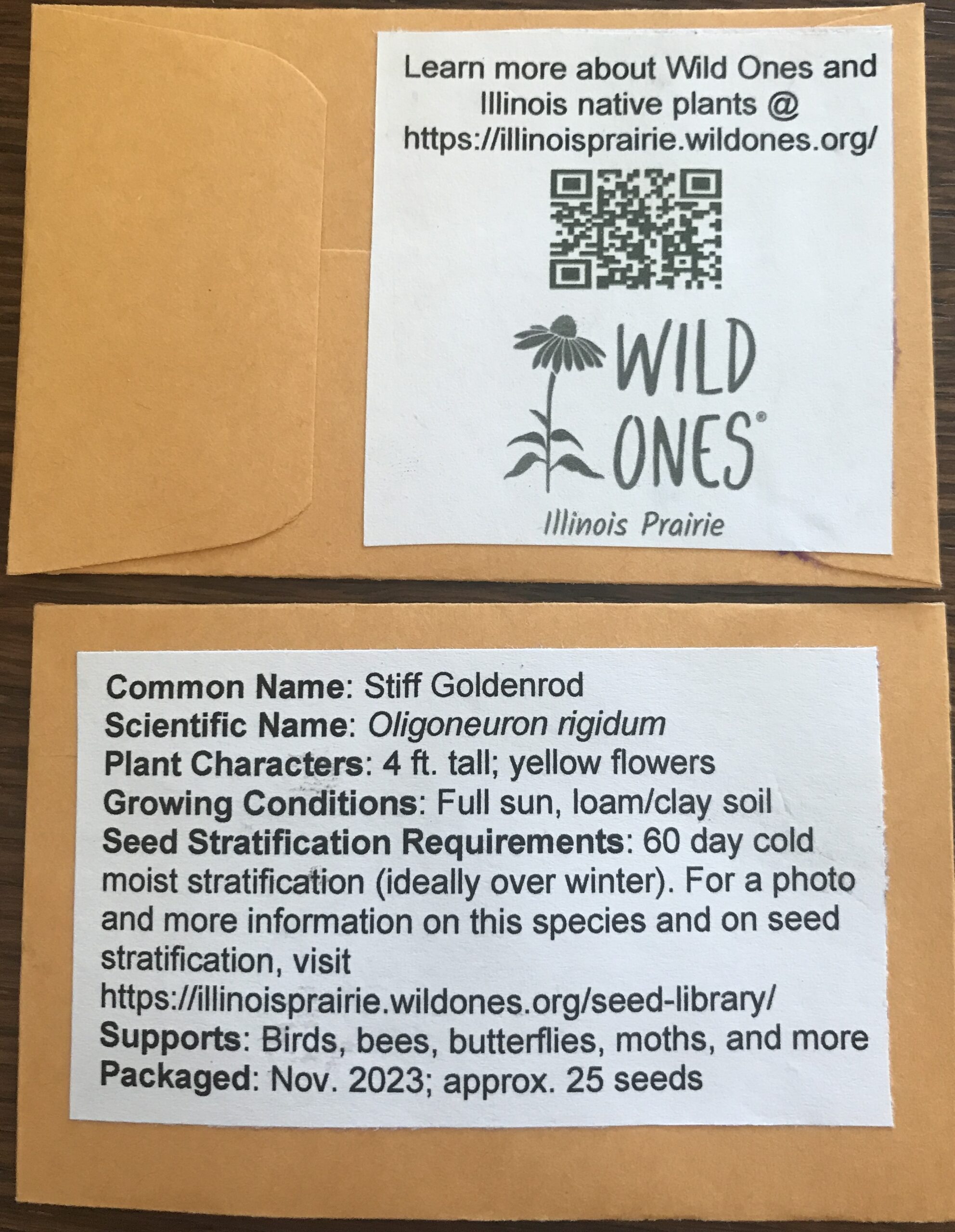Native Plant Seed Library Donations
In January 2026, Wild Ones: Illinois Prairie Chapter is again donating packets of native seed to the Normal Public Library Seed Library (206 W. College Ave, Normal, Illinois). Our chapter encourages people to plant native plants in their home landscape for a number of important reasons. Our hope is that the availability of these seeds will encourage more people to grow and plant native plant species. To learn more about the importance of native plants, how to grow them from seed, and information on the seed species donated to the library, please visit the sections below.
Why Native Plants
Over thousands of years, wild plants have grown naturally, adapting to each region’s unique environmental conditions. When grown in your garden, native plants bring beauty and excitement to your yard, creating a welcoming sanctuary that can be enjoyed at home along with many other benefits.
- Native plants are sustainable, adapted to thrive in your region’s soils and weather conditions.
- Landscaping with native plants restores a healthy, natural environment and creates wildlife habitat.
- Many natives are deep-rooted, slowing down stormwater and improving water quality as well as reducing erosion, carbon and excess nutrients.
- Natives need no fertilizer or extra watering once established.
- They act as natural pest controls and reduce the need for pesticides; many are deer-resistant.
- Native plants are the foundation of life and provide quality food for wildlife like caterpillars, as well as shelter for birds and other wildlife.
- They also invite butterflies and other pollinators with pollen and nectar rewards.
Growing Native Plants from Seed
Many native plant seeds require a period of cold moist stratification in order to break seed dormancy and for the seed to germinate successfully. This cold stratification period could take place naturally outdoors over the winter or in a refrigerator. The length of this required time period generally varies by species. However, some species do not require any pre-treatment. This downloadable guide developed by Prairie Moon Nursery provides a general overview of different germination requirements and seed starting basics for native plants. This downloadable guide from Prairie Nursery also has some useful information. Note that sources may differ in their recommendations for requirements for successful seed germination. This online guide contains links that allow you to easily determine which species fall within a specific germination code category.
The duration of cold moist stratification needed for successful seed germination of the species donated to the Normal Public Library Seed Library is noted on the individual seed packet labels. If the label says surface sow these seeds should not be covered with any soil when sown. Other seeds should be buried no more than the width of the seed when sown.
Species of Seeds Donated
 Information on and photos of the native plant species that can be grown from the 28 species of seeds donated by Wild Ones: Illinois Prairie Chapter in 2026 is available to view HERE. Quantities of these seeds are limited, and they may not all be available at any given time. Viability of native seeds can be influenced by a variety factors. Wild Ones: Illinois Prairie Chapter makes no claims on the overall viability of the seeds donated to the Seed Library. These seeds were collected by chapter members and donated for this project.
Information on and photos of the native plant species that can be grown from the 28 species of seeds donated by Wild Ones: Illinois Prairie Chapter in 2026 is available to view HERE. Quantities of these seeds are limited, and they may not all be available at any given time. Viability of native seeds can be influenced by a variety factors. Wild Ones: Illinois Prairie Chapter makes no claims on the overall viability of the seeds donated to the Seed Library. These seeds were collected by chapter members and donated for this project.
Thank you for growing plants native to central Illinois. If you have any questions about the seeds our chapter has provided to the Seed Library at the Normal Public Library, please email us at [email protected].
